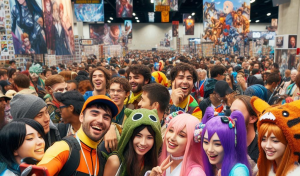
Introduction
Fan culture has grown from niche communities into mainstream influencers, reshaping how entertainment is created, marketed, and consumed. This article explores the evolving role of fan culture in shaping entertainment trends, offering insights into its impact, key drivers, and future potential.
What Is Fan Culture?

Fan culture refers to the passionate communities formed around specific shows, movies, books, music, or games. These fans go beyond passive consumption, contributing actively through discussions, fan art, cosplay, and even organizing events.
The Rise of Fan Culture
Fan culture has grown significantly over the years. What started as small, dedicated groups of people sharing their love for certain movies, shows, or books has now become a huge part of the entertainment industry. Social media, streaming platforms, and online communities have made it easier for fans to connect and grow their influence. Today, fans are more active than ever in shaping what becomes popular and how content is made.
How Fan Culture Shapes Entertainment Trends

1. Boosting Popularity Through Word of Mouth
Fans often act as unpaid marketers by spreading excitement about their favorite content. Social media platforms amplify their voices, making fan recommendations more trusted than traditional advertising.
2. Influencing Storylines and Character Arcs
Creators increasingly pay attention to fan feedback to guide their decisions. Shows like Stranger Things or Game of Thrones have adjusted narratives based on fan reactions, showing how powerful fan influence has become.
3. Driving the Success of Merchandise and Spin-offs
Merchandise sales, spin-offs, and sequels often owe their success to enthusiastic fan bases. For example, franchises like Star Wars and Marvel thrive due to loyal fan communities supporting related products.
4. Empowering the Rise of Independent Creators
Fan culture doesn’t just support mainstream entertainment—it’s also a powerful ally for indie creators. Platforms like Patreon and Kickstarter allow fans to directly fund the artists and content they love.
The Benefits of Fan Culture
Fan culture offers many benefits to the entertainment world. Fans are passionate and loyal, which helps spread the word about new content. This word-of-mouth marketing is often more trusted than traditional ads. Additionally, fans often contribute their own creativity, making art, writing, and other content based on their favorite shows or characters. This active involvement can also lead to higher sales of merchandise and the success of spin-offs or sequels.
The Role of Fan Culture in Entertainment

Fan culture plays an important role in entertainment today. It doesn’t just support content, it helps shape it. Fans give feedback, discuss storylines, and even create their own versions of characters and scenes. This feedback can influence writers and creators, helping them adjust their shows or movies. In many cases, fan opinions have led to changes in how stories are told, and even how characters develop.
Fans as Creators
In today’s world, fans aren’t just consumers—they’re creators too. Many fans make fan art, write fan fiction, or even create their own videos inspired by their favorite characters. This creativity has become a big part of fan culture. Some creators even acknowledge or celebrate the work of fans by sharing it online. For example, popular TV shows or movies often feature fan art on their social media pages, showing how important fan creativity is in today’s entertainment world.
How Fans Influence What’s Popular

Fans play a big part in deciding what becomes popular. Before social media, it was harder for people to share their opinions. Now, fans can easily discuss their favorite shows, movies, or games online. This makes it easier for new trends to spread quickly. If fans love something, they share it with their friends or post about it online. This helps smaller, lesser-known content get noticed and grow in popularity.
Fans and Social Media
Social media has made it even easier for fans to express their opinions and connect with others. Platforms like Twitter, Instagram, and TikTok allow fans to share their thoughts instantly. Hashtags and viral trends help spread fan-created content, like memes, fan art, and videos. Social media also helps fans organize events, like watch parties or conventions, where they can meet creators and other fans in person. This direct connection between creators and fans has changed the way entertainment is shared and consumed.
Fans and Merchandising

Fan culture also has a big impact on the sale of merchandise. When fans love a show, movie, or game, they often want to buy products that show their support. This can include clothing, posters, toys, and collectibles. Merchandising is not just a way to make money for creators; it also gives fans a way to express their love for the content they enjoy. Limited-edition items or fan-designed products can make these items even more special. Fans feel proud to own something that connects them to their favorite entertainment.
The Role of Fan Voting and Polls
With the rise of social media and online platforms, fans now have more influence through voting and polls. Many TV shows, movies, and even video games use fan polls to decide certain outcomes. For example, a reality TV show might let viewers vote for their favorite contestant. Movie franchises like Star Wars and Marvel sometimes allow fans to vote on which character should get their own spin-off. This direct involvement in decision-making makes fans feel valued and helps creators understand what their audience wants.
How Fans Shape Storytelling
Fans often have strong opinions about the direction of a story, and their ideas can influence how a show or movie develops. For example, fans might suggest plot twists, character backstories, or even endings. Creators sometimes listen to fan feedback and incorporate it into the story. This doesn’t mean creators always follow fan suggestions, but the growing connection between creators and fans means that storytelling has become more interactive. Fans can make their voices heard, and this keeps entertainment fresh and exciting.
Fan Culture and Global Impact

The power of fan culture isn’t just limited to one country or region. With the internet, fans from all over the world can connect and share their love for content. This global community means that a TV show, movie, or video game can reach people from different countries and cultures. For example, anime, which began in Japan, has a massive fanbase in countries around the world. As fan culture spreads, it leads to more global collaborations and a greater appreciation for different types of entertainment.
Fan Culture and Business
The entertainment business has also noticed the power of fan culture. Companies now know that a strong fanbase can lead to more success. That’s why they often focus on building loyal communities around their products. From movie merchandise to gaming conventions, fans are a key part of the business side of entertainment. Big franchises like Marvel or Harry Potter earn a lot of money from their dedicated fanbases who buy merchandise, attend events, and support the brand in many ways.
The Growing Role of Crowdfunding
Crowdfunding is another way that fan culture is changing entertainment. Platforms like Kickstarter and GoFundMe allow fans to directly fund creative projects. If a creator has a good idea but needs money to produce it, fans can help by contributing. This has allowed independent filmmakers, musicians, and game developers to bring their ideas to life without needing big companies behind them. Fans have a direct role in making new content possible, which strengthens the connection between fans and creators.
The Power of Fan Feedback

One of the biggest ways fans influence entertainment is through feedback. Creators often listen to fan opinions about storylines, characters, or even how a show should end. For instance, if fans dislike a character or a plot twist, creators may decide to change it. Sometimes, fans even demand a sequel or a spinoff. This feedback is powerful because it shows that fans are not just passive viewers but active participants in shaping content. It also helps creators understand what works and what doesn’t with their audience.
Challenges of Fan Culture
While fan culture has many benefits, it also comes with challenges. Not all fans are happy with every decision creators make, and some groups can become very vocal or demanding. This can put pressure on creators to change their original ideas to satisfy fans. Toxic fan behavior, like bullying or harassment, is also a serious issue in some communities. Balancing the expectations of fans with the creator’s vision can be difficult.
The Future of Fan Culture

The future of fan culture looks exciting and full of potential. As technology continues to improve, fans will have even more ways to interact with their favorite content, from virtual reality experiences to live fan events. The rise of independent creators and crowdfunding platforms will also allow fans to directly support the artists they love. Fan culture will continue to grow and evolve, helping shape the entertainment of tomorrow.
Analysis Table: Impact of Fan Culture on Entertainment
| Aspect | Positive Impact | Negative Impact |
|---|---|---|
| Marketing | Builds hype and credibility | May spread biased or inaccurate information |
| Creative Direction | Encourages collaboration between creators and fans | Can limit creative freedom due to vocal criticism |
| Merchandise & Spin-offs | Boosts sales and supports franchise growth | Risks oversaturation of the market |
| Independent Creators | Provides financial and moral support | Creates high expectations and pressure |
Comparative Table: Traditional vs. Fan-Driven Entertainment Trends
| Factor | Traditional Entertainment | Fan-Driven Entertainment |
|---|---|---|
| Content Creation | Controlled by studios/companies | Influenced by audience feedback |
| Marketing Approach | Advertisements and promotions | Social media and fan advocacy |
| Engagement Level | Passive audience | Active community participation |
| Revenue Model | Ticket sales and ads | Merchandise, crowdfunding, and events |
Conclusion
In conclusion, fan culture has a powerful and growing influence on entertainment trends. Fans no longer just passively consume content—they actively shape it through feedback, creativity, and support. From creating fan art to influencing storylines and promoting social change, fans have become key players in the entertainment world. The rise of social media and online platforms has allowed fans to connect with others, share their love for content, and even impact the future of their favorite shows, movies, and games. As entertainment continues to evolve, fan culture will remain a driving force, helping to shape the industry in exciting new ways.









